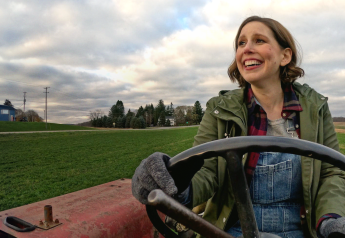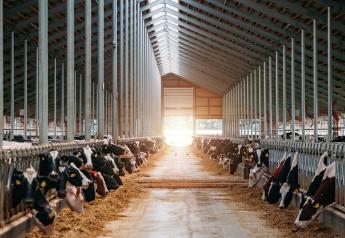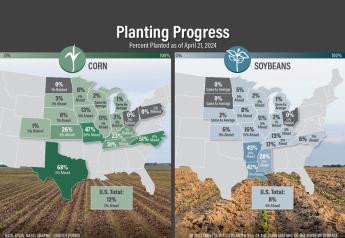California Presses Toward a Federal Order

The state's three major dairy co-ops plan to submit a federal order petition in early 2014.
California continues to inch closer toward a Federal Milk Marketing Order (FMMO), but the cooperatives leading the effort aren’t disclosing much about the proposal they’re drafting.
The state’s three major dairy co-ops––California Dairies Inc., Land O’Lakes and Dairy Farmers of America—"plan to meet with USDA to discuss the language and intend to have a petition ready to file with USDA by early 2014," says Marie teVelde, California Dairies spokeswoman.
Bonus Content | |
| Web resources: |
That’s just about all the co-ops will say publicly. They’re staying aligned, cautious and private as they develop the crucial FMMO petition for USDA, according to Tom Wegner, Land O’Lakes’ director of economic and dairy policy.
"We are still in the process of developing the best proposal for California’s dairy farmers," Wegner says.
Once they submit the FMMO proposal early next year, the three co-ops, who represent 80% of the Golden State’s milk production, will have to wait on USDA. The federal order process, which can take more than a year, includes a USDA administrative hearing, findings and a referendum vote. The vote would require two-thirds majority support of California’s dairy producers to implement the FMMO.
If the petition succeeds, California would jettison its state-regulated dairy pricing structure of more than 60 years and become the nation’s 11th FMMO.
As part of their research, California Dairies, Land O’Lakes and Dairy Farmers of America commissioned University of Wisconsin dairy economist Mark Stephenson and colleague Chuck Nicholson of Penn State University to conduct a comprehensive modeling study of a California FMMO last November. In June, Stephenson and Nicholson delivered the final 140-page report to the three co-ops. According to a news release California Dairies sent out in June, the study’s findings "indicate that a properly written FMMO for California would provide a regulatory structure that would potentially result in higher farm gate prices, which would benefit California dairy farm families."
Apart from that statement, none of the findings have been released publicly, although the co-ops have held member-only meetings to discuss FMMO potential.
 |
Producer interest in a federal order has been high at California meetings, like this one at World Ag Expo in Tulare last February. Many are frustrated with California’s state-regulated pricing structure. |
Among the FMMO components under scrutiny is California’s quota system. An asset valued statewide at $1 billion, quota returns to producers who own it as much as $1.70 per cwt. of additional income. Quota has been part of California’s state milk pricing system for four decades. But how to incorporate it into California’s FMMO has raised questions, since no other federal order includes a similar quota system. Few California quota-holders are willing to relinquish it.
U.S. Congressman David Valadao (R-Calif.), who is also a dairy producer, introduced bipartisan legislation March 22 that would allow California dairy producers to petition USDA for a federal order, plus allow them to keep the state’s quota program.
Valadao’s bill is an important part of the FMMO discussion, says Wegner with Land O’Lakes. Similar language is also included in the farm bill. Rob Vandenheuvel, general manager of the California-based Milk Producers Council, says the three co-ops have made it clear they won’t proceed with an FMMO unless California’s quota system is protected.
But keeping the quota isn’t clear-cut. "There is still a great deal of uncertainty surrounding how quota would operate within an order, how it would be funded, ultimately how compatible quota is with the federal order structure and whether or not it is sustainable in the long run," says Bill Schiek of the Dairy Institute of California, which represents the state’s processors.
Another concern is the length of time needed to adopt a California FMMO. "We need a fundamental change as soon as possible, and in the case of a FMMO, ‘possible’ is sometime in 2015," Vandenheuvel says. "So producers are urging industry leadership to move this process along as quickly as possible."
Schiek and the rest of the dairy processor community are a little more hesitant to wave the FMMO banner. "Dairymen in California need to understand that a federal order is not the same as ‘a California state order with higher prices’," Schiek says. "They operate quite differently, and those differences have implications for producers."
A California FMMO: Thumbs Up or Thumbs Down?
Like many California dairy producers, Joe Augusto believes the only way to restore equity to milk pricing in the Golden State is by joining the FMMO system.
"On average, dairy producer prices in California have been $1.05 per cwt. lower than prices paid in the federal order, causing the average-sized dairy in our state to be paid nearly $600,000 less than the same sized dairy in the federal order system since January 2011," says Augusto, president of the California Dairy Campaign, a grassroots organization of dairy farmers.
Rob Vandenheuvel of the Milk Producers Council agrees. "California dairy farmers need a milk price that at least covers their costs," he says. "It has become apparent that the California
Department of Food and Agriculture has been unwilling to make the adjustments necessary to facilitate long-term profitability by California dairy farmers. This has resulted in massive
equity loss by California dairy families and now-weekly dispersal sales. This is why we are seeing a growing interest in pursuing a California FMMO."
The state’s processors haven’t taken a stand yet on a California federal order. "We have not seen the actual proposal," says Bill Schiek with the Dairy Institute of California. "Our opinion will depend on how the order would operate as contained in the actual proposed order language."
Federal orders typically have more flexibility in pooling and minimum pricing than the California state order does, and some processors might like that, Schiek adds. Some processors who produce only manufactured products (no fluid milk) might opt to operate entirely outside the pool and therefore would not be subject to minimum prices.
"The decision on whether or not California producers decide to adopt a federal order for California is entirely theirs, but the process to obtain one involves a hearing in which all parties participate, and the outcome might be different from what producers propose," Schiek says. "California dairymen will ultimately be voting on what USDA decides is an appropriate order for California, which might not be exactly the same order that California producers put forward for consideration."
Another Perspective
 |
Michael Marsh |
Michael Marsh, CEO of Western United Dairymen, has closely followed the progress of a California Federal Milk Marketing Order (FMMO). A trade association whose members account for 60% of California’s milk production, Western United Dairymen represents dairies on labor law, environmental regulations and pricing issues. Marsh shares his insights on a California FMMO.
What does the Stephenson/Nicholson study on a California FMMO show?
Marsh: Since the cooperatives have not released the Stephenson/Nicholson study, I do not know. According to some cooperative board members who have seen the study, the economists seemed to indicate that the best route for California to take would be to reconnect our 4b price to the market for cheese through our existing order at the California Department of Food and Agriculture.
What are some downsides of adopting a California FFMO?
Marsh: The McKinsey Report suggested that one downside was that it put us in the same boat with our domestic competitors. The operation of an FMMO and the existing California order are very, very different, and that is not well understood. The differences are vastly more significant than the value of whey.
What effect would a switch to an FMMO have on the state’s quota system?
Marsh: We do not know. The farm bill language attempts to address it. We have developed language as an amendment that would strengthen the quota protection if a California FMMO is put into place. Historically, state order quota systems that have morphed into FMMOs have not fared well. This is a chilling thought if you are a dairy producer owning part of that $1 billion asset that carries a potential $4 billion economic impact to its owners.
Rep. David Valadao (R-Calif.) has introduced bipartisan legislation that would allow California dairy producers to petition USDA for a federal order plus allow them to keep the state’s quota program. Where does this bill stand? What are its chances for its passage?
Marsh: Rep. Valadao’s bill has not been heard in committee, and I don’t expect that it will. Similar language is included in the farm bill. Passing freestanding dairy legislation is very difficult. In fact, I can think of only one freestanding dairy bill that has passed through the Congress in the past 30 years.
Why do pooling and depooling enter into the FMMO discussion?
Marsh: This is just one of the many significant differences between the California Order we have today and FMMOs. If you are a nonpool or a depooled plant in the California order that exists today, you are required to pay at least the regulated minimum price for the milk’s usage. Depooled or nonpooled plants in FMMOs are not required to pay any regulated minimum price. That is a big difference.







